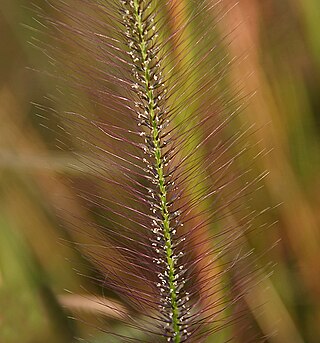
Saccharum is a genus of tall perennial plants of the broomsedge tribe within the grass family.

Stipa is a genus of around 300 large perennial hermaphroditic grasses collectively known as feather grass, needle grass, and spear grass. They are placed in the subfamily Pooideae and the tribe Stipeae, which also contains many species formerly assigned to Stipa, which have since been reclassified into new genera.

Calamagrostis is a genus of flowering plants in the grass family Poaceae, with about 260 species that occur mainly in temperate regions of the globe. Towards equatorial latitudes, species of Calamagrostis generally occur at higher elevations. These tufted perennials usually have hairless narrow leaves. The ligules are usually blunt. The inflorescence forms a panicle. Some may be reed-like.

Agrostis is a large and very nearly cosmopolitan genus of plants in the grass family, found in nearly all the countries in the world. It has been bred as a GMO creeping bent grass.

Digitaria is a genus of plants in the grass family native to tropical and warm temperate regions but can occur in tropical, subtropical, and cooler temperate regions as well. Common names include crabgrass, finger-grass, and fonio. They are slender monocotyledonous annual and perennial lawn, pasture, and forage plants; some are often considered lawn pests. Digitus is the Latin word for "finger", and they are distinguished by the long, finger-like inflorescences they produce.

Helictotrichon, or alpine oatgrass, is a genus of perennial flowering plants in the grass family. The genus name comes from the Greek heliktos meaning twisted, and trichos meaning hair, referring to the shape of the awn.

Setaria is a widespread genus of plants in the grass family. The name is derived from the Latin word seta, meaning "bristle" or "hair", which refers to the bristly spikelets.

Axonopus is a genus of plants in the grass family, known generally as carpet grass. They are native primarily to the tropical and subtropical regions of the Americas with one species in tropical Africa and another on Easter Island. They are sometimes rhizomatous and many are tolerant of periodic submersion.
Pentameris is a genus of plants in the grass family, native primarily to Africa, with a few species in Yemen and on certain islands in the Indian Ocean.

Perotis is a genus of Asian, African, and Australian plants in the grass family.

Coelorachis is a genus of plants in the grass family, widespread across much of Asia, Africa, Australia and the Americas.

Schizachyrium is a widespread genus of plants in the grass family. The name is derived from the Ancient Greek words σχίζειν, meaning "to split," and ἄχυρον, meaning "chaff." It refers to either the glume or the toothed lemmas.

Schmidtia is a genus of Asian and African plants in the grass family.

Cassia javanica, also known as Java cassia, pink shower, apple blossom tree and rainbow shower tree, is a species of tree in the family Fabaceae. Its origin is in Southeast Asia, but it has been extensively grown in tropical areas worldwide as a garden tree owing to its beautiful crimson and pink flower bunches.

Stipagrostis ciliata, the tall bushman grass, is a species of grass in the family Poaceae. The native range is from the Canary Islands, the Sahara desert to Pakistan. It occurs in Namibia's Namib Desert and the Kalahari. The grass grows 30–100 centimetres (12–39 in) tall and can be annual or perennial dependent on the amount of rainfall. It can be distinguished by a ring of long white hair surrounding each node.













